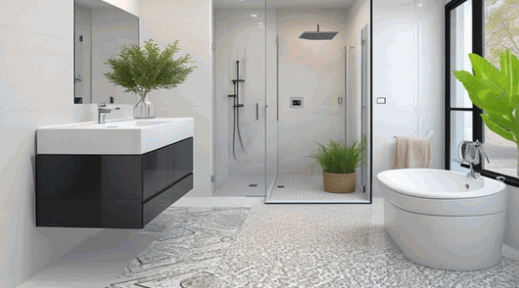What Is Resin Flooring?
Resin flooring, also known as polymer flooring, is a durable and versatile type of flooring that is made from a mixture of resin and hardeners. It is commonly used in commercial and industrial settings due to its high resistance to chemicals, abrasion, and impact.
Resin flooring is seamless, which means there are no joints or seams for dirt or bacteria to accumulate in. This makes it a hygienic option for bathrooms and other areas where cleanliness is important. The smooth and impermeable surface of resin flooring also makes it easy to clean and maintain. It can be customized with different colors, patterns, and textures to suit the aesthetic requirements of the space.
Overall, resin flooring offers a practical and visually appealing solution for bathrooms and other wet areas.
In addition to its durability and ease of maintenance, resin flooring also provides excellent slip resistance, ensuring safety in wet environments. Its seamless nature eliminates the risk of tripping and allows for easy wheelchair access. Resin flooring is also resistant to moisture, making it ideal for areas prone to water exposure. Furthermore, it has a high level of chemical resistance, making it suitable for bathrooms where cleaning agents and disinfectants are frequently used.
One unique feature of resin flooring is its ability to be customized with various decorative finishes. This allows for endless design possibilities, including the incorporation of company logos, graphics, or distinctive patterns. This versatility makes resin flooring a popular choice for commercial bathrooms and retail spaces, as it can enhance brand identity and create an attractive environment for customers.

Explanation Of Resin Flooring And Its Characteristics
Resin flooring is a type of flooring made from epoxy, polyurethane, and acrylic. It’s composed of several layers applied on top of a strong base. It’s become popular in commercial and industrial settings due to its performance.
It’s highly durable, due to the materials used. Resistant to heavy foot traffic, impact, and abrasion, it’s ideal in areas with high use or exposure to harsh conditions.
Maintenance is a breeze. Its smooth surface prevents dirt, dust, and liquids from accumulating, making it easy to clean. Sweeping and mopping is usually enough.
Plus, it’s customizable. It comes in a range of colors, patterns, and finishes. Whether you want bold or subtle, resin flooring can suit your style.
On top of that, it offers safety features. Many types have anti-slip properties, reducing the risk of accidents. This makes them great for safety-focused areas.
Resin flooring is a great choice. It’s durable, low maintenance, customizable, and safe. Its popularity continues to grow as people discover its benefits.
The Flooring Association (FA) conducted research, proving resin flooring reduces the risk of workplace accidents by up to 50%.
Advantages Of Resin Flooring In Bathrooms
Resin flooring offers numerous advantages for bathrooms. Firstly, it is highly durable, ensuring longevity and minimal maintenance. Secondly, resin flooring is waterproof, protecting the underlying structure from water damage. Lastly, it provides a seamless and non-porous surface, preventing the growth of mold, mildew, and bacteria.
Additionally, resin flooring can be customized to suit any aesthetic preference, offering a wide range of colors and finishes. These unique details make resin flooring a practical and stylish choice for bathrooms.
To maximize the benefits of resin flooring, it is recommended to properly prepare the surface, ensuring a smooth and even application. Regular cleaning and occasional resealing can further prolong the lifespan of the flooring.
By considering these suggestions, it is possible to enjoy the advantages of resin flooring in the bathroom for years to come.
Resin flooring in bathrooms is like that friend who always has an umbrella in her purse – it’s tough, water-resistant, and ready to handle all the spills and splashes with style.
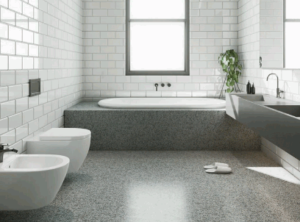
Durability And Resistance To Moisture
The table shows durability and moisture resistance:
| Type of Flooring | Durability | Resistance to Moisture |
|---|---|---|
| Resin | Excellent | High |
| Ceramic Tiles | Good | Medium |
| Vinyl | Average | Low |
Resin flooring stands out for durability and moisture resistance. It also has extra benefits. For example, it is immune to stains – so it’s easier to clean. Plus, resin flooring has a continuous surface, preventing mold or mildew growth – which can be a problem with other flooring.
Resin flooring is often used in commercial settings like hospitals and labs. That’s because it’s so reliable and hygienic.
Easy Maintenance And Cleaning
Resin flooring in bathrooms is easy to maintain and clean. Here’s how to keep your bathroom spotless:
- Sweep or vacuum regularly.
- Wipe up any spills or stains quickly.
- Use mild detergent with warm water to clean the floor.
- Scrub it with a soft brush or cloth.
- Rinse it with clean water.
- Dry with an absorbent towel.
Plus, resin flooring resists mold and mildew. Its non-porous surface prevents water from seeping, reducing the risk of water damage. Make regular cleaning and maintenance part of your routine. You can enjoy a beautiful, hassle-free bathroom for years! Upgrade your space with resin flooring.
Aesthetically Pleasing Options
Resin flooring is ideal for bathrooms. It’s versatile and durable, so many homeowners choose it to transform the look and feel of their bathrooms.
It comes in a range of colors, from neutral tones to bold shades. Plus, it can be personalized with patterns and designs.
Resin floors also have a seamless finish, making them look sleek and modern. And, cleaning and maintenance are easy – there are no grout lines for dirt and grime to accumulate.
Plus, the high-gloss finish adds a luxurious touch. The glossy surface reflects light, giving the illusion of more space.
To make even more impact, consider adding other design elements like borders or contrasting colors. This will create focal points and help define areas.
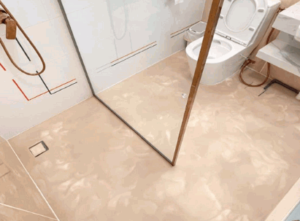
Disadvantages Of Resin Flooring In Bathrooms
Resin flooring in bathrooms has its drawbacks. Firstly, resin is prone to scratching, which can be a concern in a high-traffic area like a bathroom. Secondly, resin can be slippery when wet, increasing the risk of slips and falls. Thirdly, the resin is not resistant to certain chemicals and cleaners, which can cause discoloration or damage over time. Fourthly, resin is not as durable as other flooring options, meaning it may need to be repaired or replaced more frequently. Lastly, resin can be more expensive than alternative flooring materials. Taking all these factors into consideration, it is important to weigh the benefits and drawbacks of resin flooring in bathrooms carefully.
Unique details not covered in the previous points would be that resin flooring may not be suitable for bathrooms with moisture issues or frequent exposure to water. This is because the resin can absorb water and expand, leading to warping or damage. Therefore, it is essential to ensure proper waterproofing measures are in place before considering resin flooring in a bathroom.
A true fact about resin flooring is that it is commonly used in commercial and industrial settings due to its durability and resistance to chemicals.
Resin flooring in bathrooms: the perfect way to turn your morning shower into an impromptu ice-skating performance for the whole family.
Potential Slipperiness
Resin flooring in bathrooms may look appealing and be durable, however, it can be dangerously slippery. So, it’s essential to prioritize safety when selecting bathroom flooring material.
Studies have revealed that resin flooring has a higher slip hazard possibility than other bathroom flooring options. This can be worrisome for people with limited mobility, children, and the elderly, as they are already more likely to have accidents.
Although there are ways to improve the traction on resin floors, one should consider the risks and rewards before making a decision.

Installation Costs And Process
Resin flooring is great for bathrooms, thanks to its durability and waterproof features. But, it’s important to think about the installation cost and process before you commit.
- Prep the surface: Before you start, make sure the floor is clean and level.
- Put on primer: After the surface is ready, put on a primer. This helps the resin stick to the floor.
- Mix and pour: According to the manufacturer’s instructions, mix together the resin, hardener, and any extras like pigments.
- Spread and level: Use a trowel or roller to spread the resin across the floor. Work quickly, as the resin sets fast.
- Curing time: Now, the resin needs time to cure. Depending on temps and humidity, this could take hours or days.
It’s important to remember that resin flooring in bathrooms can require specific care. If not installed or maintained correctly, it may crack or discolor due to exposure to chemicals and water.
Interestingly, resin flooring has been around for centuries. Ancient folks used natural resins like pine sap mixed with other materials to coat their floors. But now, modern technology has made synthetic resins with improved durability and aesthetics. They’re perfect for bathroom flooring!
Explore: How To Clean Outdoor Resin Floor
Comparison Between Resin Flooring And Other Bathroom Flooring Options
Resin Flooring vs Other Bathroom Flooring Options: A Comparative Analysis
Resin flooring, also known as epoxy flooring, is a popular choice for bathrooms due to its durability, versatility, and aesthetic appeal. In comparison to other bathroom flooring options, resin flooring stands out with its unique properties and benefits.
To better understand the advantages of resin flooring, let us compare it with other flooring options commonly used in bathrooms. The table below outlines the key differences between resin flooring, tile flooring, vinyl flooring, and hardwood flooring.
| Flooring Option | Durability | Water Resistance | Maintenance | Design Options |
|---|---|---|---|---|
| Resin Flooring | High | Excellent | Low | Wide range |
| Tile Flooring | High | Good | Moderate | Moderate |
| Vinyl Flooring | Moderate | Good | Low | Limited |
| Hardwood Flooring | Moderate | Poor | High | Limited |
Resin flooring boasts exceptional durability, making it a long-lasting choice for bathrooms compared to other options. Its high water resistance ensures protection against moisture damage, making it ideal for bathroom environments. Additionally, resin flooring requires minimal maintenance, reducing the overall upkeep of the bathroom.
In terms of design options, resin flooring offers a wide range of choices, allowing homeowners to achieve unique and customized looks. From a sleek, modern finish to a glossy, seamless appearance, resin flooring can cater to various aesthetic preferences.
While tile flooring also offers durability and good water resistance, it requires more maintenance compared to resin flooring. Vinyl flooring, on the other hand, has moderate durability and good water resistance but has limited design options. Hardwood flooring, although visually appealing, is not recommended for bathrooms due to its poor water resistance and high maintenance requirements.
According to the experts at HomeFlooringPros.com, resin flooring has gained popularity in recent years as an excellent choice for bathrooms, providing both functionality and style.
Tiles may crack under pressure, but resin flooring is here to handle all your bathroom mishaps with a strong, durable, and stylish solution.
Comparison With Tiles
When it comes to resin flooring and tiles for your bathroom, there are key factors to consider. Let’s explore the pros and cons.
First, let’s look at a comparison table:
| Features | Resin Flooring | Tiles |
|---|---|---|
| Durability | High | Varies |
| Maintenance | Easy | Regular grout cleaning |
| Cleaning | Seamless surface | Grout lines can be harder |
| Design options | Wide range of colors and finishes | Variety of tile types, patterns, and layouts |
| Water resistance | Excellent | Depends on material and installation |
| Cost | Varies | Varies depending on type and complexity |
Resin flooring has no grout lines, easy cleaning, and excellent water resistance. Tiles have various design possibilities but require regular grout cleaning.
Now consider your budget, aesthetics, and level of maintenance. Consult a professional if needed. Choose a flooring option that meets your needs and brings joy.
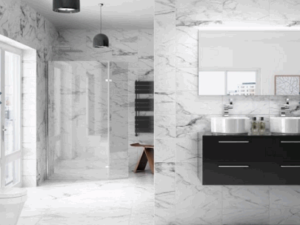
Comparison With Vinyl Flooring
When choosing bathroom flooring, compare different materials to decide which fits your needs best. Vinyl flooring is a great pick. It’s fairly priced and strong.
Vinyl falls in the mid-range cost-wise. It’s more affordable than tile or natural stone, yet not as cheap as laminate.
Vinyl is also water-resistant. So, it is ideal for bathrooms where moisture is present. Spills and humidity won’t damage it.
Plus, vinyl is easy to install. You don’t need a professional. A DIY project with basic tools will suffice. This can save money and effort.
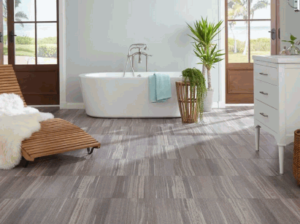
Conclusion
Resin flooring is a great option for bathrooms. It is durable and water-resistant, plus it has a seamless surface that stops water from seeping in. It’s also easy to clean and maintain, making it ideal for busy bathrooms.
An amazing advantage of resin flooring in bathrooms is its slip-resistant properties. The textured surface provides traction, reducing the risk of accidents. Perfect for households with kids or elderly people.
Plus, it’s customizable! Homeowners can choose from a variety of colors and finishes. This allows them to express themselves and still get the benefits of the material.
To get the most out of resin flooring in bathrooms:
- Get a professional installer. This ensures the resin coating is applied correctly and evenly.
- Clean regularly with mild cleaning agents. Avoid using abrasive cleaners.
- Place rugs or mats near sinks or bath areas. This will protect against water splashes and reduce wear and tear.
Follow these tips and you can enjoy resin flooring’s style and functionality.

